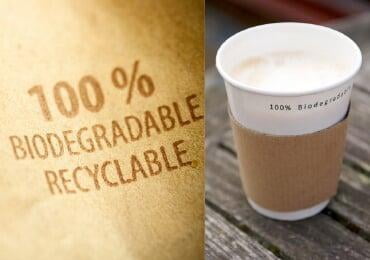
Biodegradable plastics will enter people's daily life after they come out of factories, and will also be widely used in agriculture, fishery, and medicine. However, are biodegradable plastics suitable for these scenarios? Can they be truly "degraded" in these scenarios? Will it create...

In recent years, the frequency of ordering takeaway meals has increased significantly for reasons of time saving and food abundance. Is it possible to eat healthy when you entrust three meals a day to a catering takeaway? How can you tell the digital logo on a plastic box?
Most of the utensils ...

Do you want to go paperless? In today's world, consumers are increasingly responsible for being aware of their carbon footprint and taking active steps to reduce it. Banking companies such as Santander say that by moving your paper bank statements online, you are doing your part to achieve a more su...

"You Ask is a series in which Columbia Climate School experts address readers' questions about science. Today, we talk with Steven Cohen, director of the Earth Institute's Sustainable Policy and Management Research Program, about litter-related issues.
Cohen is an expert in sustainable cit...

Although recycling and reuse have always been strongly advocated, in reality there are many simple and low-power small electronic devices that are often disposable. Because of this, "disposable batteries" are also one of the areas of interest for scientists.
Recently, scientists at th...

Petroleum-derived plastics (traditional petroleum-based plastics) are lightweight, strong, durable, and resistant to degradation, replacing many other substances in the form of disposable gears, packaging, furniture, machinery frames, accessories, etc. They are widely used in medical and industrial ...

Bio-based Materials (BBMs) are a new class of materials made from renewable biomass or (and) biologically manufactured raw materials through biological, chemical and physical means, such as bioplastics and biomass functional polymers.
Bio-based materials are different from traditional chemical ...

What are green composites?
Green composites in a narrow sense are composites in which at least one of the component materials is obtained from natural resources and is completely degradable. Also known as biocomposites or ecocomposites.
Green composites in a broad sense, from the requireme...

There are more than 5 billion plastic particles floating on the surface of our oceans, causing significant damage to organisms, fragile underwater ecosystems and even the climate. Until now, it has only been possible to determine how long it takes for plastics to completely degrade by extrapola...

One of the major environmental issues facing the planet today is the rising level of plastic consumption and waste. According to a recent OECD study, 460 million tons of plastic were produced globally in 2019, and consumption will continue to grow despite the expected increase in the deployment of r...